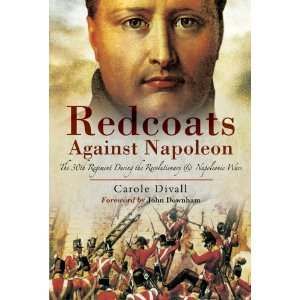Victoria and I met author Carole Divall at Waterloo this past June and Carole was kind enough to agree to do a guest blog for us on her research into the Napoleonic Wars and the 30th Regiment.
When I started researching the 30th (Cambridgeshire) Regiment fifteen years ago, I had no idea where my investigations would take me. Suffice to say, at the time I was merely looking for a means of moving my general interest in the period of the Revolutionary and Napoleonic Wars into something more specific. Initially, I merely dabbled as time allowed. What I discovered, however, was a wealth of material: official documents, newspaper reports, journals and letters which brought to life several thousand men who demonstrated all that is good, bad and ugly in the human race. It was then that I decided their experiences should be recorded in a book.
According to Ralph Waldo Emerson, “There is properly no history, only biography.” To write a history of a regiment is to write the biographies of the men of that regiment. The more I researched, the less I was satisfied merely with what the 30th did. Instead, I wanted to discover what made the men tick – officers, NCOs and other ranks. And I certainly found everything from the dedicated officer and zealous private to the dishonest NCO and criminal “king’s hard bargains”.
Even my first book, Redcoats Against Napoleon, which focused on the deeds of the 30th between 1789 and 1817 (with an extension to 1829 to cover events in India) adopted a more biographical perspective than the conventional military history approach. I wanted the reader to be able to share the experiences of the men who fought from Toulon (1793) to Waterloo, whether it was suffering the heat and thirst of Egypt, the incessant rains of Portugal, or the desperate stand in the center of Wellington’s line at Waterloo.
My second book, Inside the Regiment, which comes out next February, attempts to open the door on the private life of the 30th, and explore how it functioned on a day-to-day basis. For example, what was it about the command style of Lieutenant Colonel Alexander Hamilton that made him such an inspiring leader of men? What exactly were the offenses of the king’s hard bargains? Were all the men in the ranks merely “the scum of the earth?” What was it like to be a recruit? How did the officers spend their leisure time? Were the surgeons really as incompetent as history suggests? And what about the women? Did they have a part to play in the life of the regiment?
Like all biographers, I hope I have brought my subject (or, more accurately, subjects) into the limelight. The 30th were only one of a hundred infantry regiments. Although they were unique, they were also representative of all those other units which fought for king and country, for duty, for the chance of plunder – but, most of all, for their regiment.
If you would like to know more about the 30th Regiment, look on my website for details of what the two battalions were doing exactly a hundred years ago.











